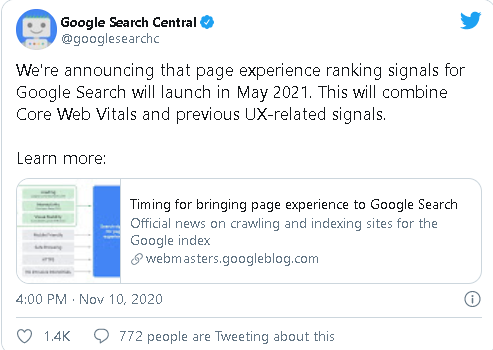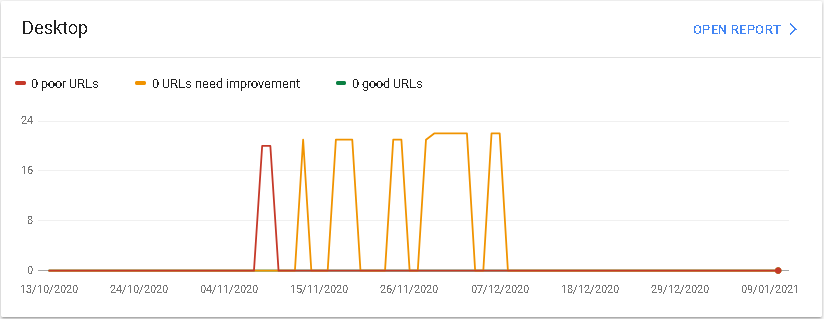-
We’ve collected industry expert predictions on what 2021 could look like for SEO.
-
The COVID-19 pandemic has affected a number of different industries, including that of SEO.
-
Here, we explore the predictions made by experts such as Climb Online’s Mark Wright, Blueclaw’s Jordan Hilliard and First Internet’s Benet Thomas.
The events of 2020 have brought considerable change to many different industries, including SEO. As internet use and online searches increased throughout lockdowns and tiered restrictions, SEO professionals have had an interesting year to say the least.
As we enter 2021 still amidst stay at home orders and lockdown restrictions, what are experts’ predictions on what the new year will bring?
Our Panel of Experts:
- Mark Wright – Managing Director of Climb Online
- Tom Shurville – Managing Director at Distinctly
- Imogen Wallis – Digital Client Manager at Milk & Honey PR
- Jordan Hilliard – Senior SEO Lead at Blueclaw
- Dan Rawley – SEO Specialist, International and Start-ups at Twinkl Educational Publishing
- Tim Cameron-Kitchen – Founder and Head Ninja at Exposure Ninja
- John Hutson – Head of SEO at Climb Online
- Benet Thomas – Head of SEO at First Internet
- David Soffer – Co-Founder and Editor of TechRound
- Kelly Newcomb – Digital Marketing Specialist at Plume
- Cheryl Luzet – CEO at Wagada
- Jessie Moore – SEO Consultant at Pocket Consultancy
- Jason Stallard – Director at Station Rd Marketing
- Beth Barnham – SEO Specialist at Foundation Agency
- Charlotte Rudd – Senior SEO Specialist at Liberty Marketing
- Emma Nesham – Digital Marketing Team Leader at Purple Creative Studio
- Abhishek Joshi – Digital Marketer
- James Whittall – Founder and MD of Influx Digital
For any questions, comments or features, please contact us directly.

Mark Wright, Managing Director of Climb Online

PR led SEO strategies will be key:
“In recent years we have seen an increasing shift in the correlation between digital PR and SEO, which will continue to grow and accelerate throughout 2021. Gone are the days of publishing average, keyword heavy content on sites with low to medium domain authorities. Now, the most successful strategies are those that fully integrate PR and SEO activity, where quality content published on authoritative media sites generates the best results.”
“More and more digital marketing professionals have come to realise this in recent years, which not only means the quality of the content needs to be on point, but SEOs need to shift mindset and generate more PR led content ideas to ensure their articles will consistently be published with relevant backlinks from high domain authority sites.”
Google Analytics 4:
“Another key change in 2021 will be Google’s roll out Google Analytics 4, which has been described by the search engine giants themselves as an analytics tool that provides smarter insights to improve ROI as “digital marketing moves to a cookie-less world”.”
“As a result, digital marketing professionals will need to invest more time into not only learning what has been described as a far more sophisticated analytics platform, but to revise how they utilise it; focusing more on behavioural analytics to understand what users are doing, how they are doing it, and how they can drive more web traffic, and then utilising this information to create relevant and quality SEO content.”
Apple’s ATT Framework:
“A fundamental change for the entire digital marketing industry in 2021 will be the introduction of Apple’s mandatory privacy consent requirements, which will include the implementation of the App Tracking Transparency [ATT] framework. This will give digital advertisers far less insight into target audience behaviour, placing more weight on the value of effective SEO strategies to engage and drive web traffic from relevant web users.”
Tom Shurville, Managing Director at Distinctly

“Google will continue to focus on speed and mobile experience. Core Web Vitals provided SEO’s with a far greater understanding of how Google measures both speed and usability. Once these factors are incorporated in the algorithm I’d expect Google to double down on their importance. Fortunately, we’ve had plenty of time to prepare for this change but for those that haven’t heeded Google’s advice it could lead to ranking turbulence and a scramble to improve websites.”
“The other area that I can see evolving is digital PR/link building. The last couple of years have seen huge growth and maturity of this part of the SEO process. As with everything, what Google wants is somewhat open to interpretation and this has led to lots of agencies chasing link numbers, often at the expense of relevancy. I think 2021 will see a slight recalibration of what is deemed a ‘successful PR campaign’. Link numbers alone are not enough and in some instances create more problems than they solve.”
“It’s up to marketers to educate clients that relevancy is key and to move away from link numbers being the primary judge of a campaign’s success. I’d expect some tools and softwares to launch to assist with this by the end of the year.”
Imogen Wallis, Digital Client Manager at Milk & Honey PR

“Quality content should be at the very heart of your marketing strategy. For years now, Google and other search engines have been penalising websites for bad SEO practices and poor content creation. The idea of writing a piece of content 2,000 words long might terrify some, but it’s these in-depth articles that will help website owners displaces other high-ranking sites that have no business being there.”
“Google has continuously reiterated that content quality is key for ranking success – demonstrating expertise, authoritativeness, and trustworthiness (E.A.T). As users spend more time online, gaining their trust amongst the competition is crucial, increasing user time on site and decreasing bounce rate. To build authority, site content will now need to back up any claims made with evidence. Not only linking to other authoritative sites but generating backlinks from other high-ranking domain websites too.”
“The idea of longer content isn’t particularly new if you look back to Google’s algorithm update ‘Panda’ in 2011 . However, the understanding of what is considered high-quality content does mean SEO practitioners need to work more collaboratively with full marketing teams, to create shareable information that keeps users engaged. Besides incorporating targeted keywords and sources to build authority, content must consider your target audience persona. By taking into consideration their journey with you as a business and how they like to consume content online, users and search engines will consider the content to be of higher value with a positive reputation.”
Jordan Hilliard, Senior SEO Lead at Blueclaw

“2021 will be the year Google truly focuses on User Experience. It has always been a part of the agenda but with all the previous algorithm updates resolving a lot of the black hat tricks/hacks, Google can now put it’s full weight behind finding and ranking the best websites that not only match users search queries but also provide users with the most ergonomic service.”
“How it will do that will likely comprise of several different quality ratings, with the largest ones being Page Speed, Natural Content, Readability and all the elements involved in Google E-A-T qualities.”
More from Interviews
- A Chat with Kebbie Sebastian, CEO and Founder of Merge
- Meet Dr Agnès Leroy, GPU Director at Cryptography Tool: Zama
- Meet Roman Eloshvili, Founder of ComplyControl
- Inside Mobile Payments with Bojoko’s Ville Saari
- Meet Steve Haskew, Group Director of Sustainability and Growth At Circular Computing
- A Chat with Hakob Astabatsyan, CEO and Co-Founder of Synthflow AI
- Meet Ernesto Suarez, CEO at Travel Insurance Provider: Gigasure
- Under Pressure and On the Clock: Gurhan Kiziloz’s Nexus International to Hit $1.45B Revenue in 2025
Dan Rawley, SEO Specialist – International and Start-ups at Twinkl Educational Publishing

“Google began to roll out its ‘Expertise, Authority, Trust’ factors for assessing websites’ credibility last year, and I would expect this to continue in 2021. The momentous breaking news stories we saw as the pandemic unfolded last year demonstrated more than ever the need for search results to be accurate and up-to-date. It really put the spotlight on Google’s ability to filter out misleading or unreliable information.”
“This brings new opportunities for SEOs but also means that websites need to adapt to make sure their content adequately proves their website’s credibility. This year I am advising businesses I work with at TwinklHive, Twinkl’s business accelerator, to focus on demonstrating how they are experts in their fields and emphasising the missions behind their companies to search engines and users alike.”
“Secondly, the COVID-19 pandemic has likely increased the number of new queries. It has been estimated in the past that 15% of all Google searches have never been seen before. Considering how the pandemic has disrupted search behaviour in many industries, I would expect that figure to now be even higher.”
“For example, changes to the way many industries operate due to Coronavirus has meant people now increasingly search for services “near me” or “open now”. This is interesting as it means there are fresh keywords that have never been targeted before and competition for ranking positions may be lower.”
“Being an educational publisher, we saw a huge shift at Twinkl in our audience’s search behaviour as schools closed and children began remote learning. We were able to use live search tools to track emerging keywords to allow us to keep up with new customer demand and continue to fulfil our mission of helping those who teach. I would expect this to remain part of our SEO strategy in 2021, and even after the pandemic is over!”
Tim Cameron-Kitchen, Founder and Head Ninja at Exposure Ninja

“My first prediction for 2021 is that Google’s core web vitals update will hit a lot of unsuspecting sites pretty hard! It sets a pretty high benchmark for speed, particularly given the popularity of popular CMSs like WordPress, which can struggle to achieve the required targets without significant development work.”
“My second prediction for SEO in 2021 is that search behaviour will be the most meaningful difference. As territories come in and out of lockdowns and buying habits continue to accelerate tendency towards eCommerce, SEO will play a larger role and become more competitive. Stores will continue to look at diversifying their traffic sources, realising that building their traffic strategies purely around paid ads is a very expensive way to buy growth — particularly as CPCs in many industries have increased significantly since the start of COVID-19.”
John Hutson, Head of SEO at Climb Online

“Rather than 2021 being the year of “Push Results”, I would be inclined to say that during this year, there will be continued efforts to make this a reality.”
“Over the last few years, I have believed Google specifically, has been trying to pre-emptively provide their users information, based on their prior behaviour and search history.”
“This has been fairly evident on Android phones with the Google Assistant “page” becoming a personalised hub of news, articles and subject matter that typically resonates with the end user. The ability to mark things as not relevant, further tailors this experience.”
“I have no doubt, that this gets populated by browser history, search terms, location data and YouTube viewing habits, as well as what apps you have installed.”
“This is why I have used the term “Push Results”. Much like push notifications from apps and websites, you are getting served information without having to seek it.”
“With Google actively encouraging SEOs to optimise for the user first, for the last several years, I have been noticing that you get rewarded much greater than if you were to still be optimising for the search engines and the short tail search terms.”
“Being ever-present across the entire search and online journey is what counts, and you will reap the rewards across your entire channel mix by building a stronger brand presence all the way from short tail to longer tail search terms and queries.”
“Break down the user journey into Awareness, Consideration and Intention (or other equivalents), and you’ll be well placed with understanding what content is required, what format, and indeed what site architecture is suitable for such an approach.”
“Couple this with a fast site, with good UX and solid calls to action, and you can outperform the competition that concentrates on being visible for the ready-to-buy portion of the journey.”
For any questions, comments or features, please contact us directly.

Benet Thomas, Head of SEO at First Internet

1) Page/User experience will be critical to the success of a website:
“Any SEO professional worth their salt is likely to be talking about Google’s increased emphasis on user experience and for good cause.”
“Google has made it clear that websites that are slow to load, are lacking HTTPS and aren’t mobile responsive amongst other factors they deem negative to the user experience are likely to be affected by the core algorithm update scheduled for May of this year:”

“Google has made a new report for the ‘Core Web Vitals’ aimed at indicating the speed in which; the website loads, becomes stable and general fully ‘interactive’ depending on what device the website is being viewed on.”

“It’s safe to say that websites with a large percentage of URLs that Google’s Core Web Vitals report deems to be “Poor” or “in need of improvement” will be negatively affected once the May Core Algorithm update rolls around.”
2) In 2021 Voice search will be more beneficial for Local businesses than Ecomm:
“Voice search has been the ‘next big thing’ in SEO for the past five years it seems, however, with the introduction of the ‘Speakable’ structured data type and its applications to GMB (Google My Business) and location-based searches I believe that voice search will help improve the fortunes of local businesses long before its true scope of uses for e-commerce based websites are realised.”
“A study by Adobe revealed that 52% of users who search using their voice requested directions to a business.”
“By implementing the ‘Speakable’ schema to the business address located on a website, not only are you making it infinitely easier for Google and other search engines to feature you on voice search but say you were a Mechanic in Scunthorpe if your business is the only one to have implemented Speakable schema throughout the website, subject to other optimisation elements being set up correctly, you’re going to be increasing the likelihood that you’ll gain placement on voice-related searches for “Mechanic near me” in your locality.”
David Soffer, Founder and Editor in Chief of TechRound

“Google change and update on a daily basis, with small tweaks to their algorithm regularly. Those bigger updates and those core updates everyone looks out for have however, been harder to predict in recent times. User intent though is an area which both Google and users are placing more importance than ever upon.
For websites and businesses trying to improve and optimise their SEO in 2021, you always have to remember to fulfil and feed the needs and wants of your userbase.
There is no point serving up irrelevant content to audiences which don’t want it. Google uses machine learning to improve and update their algorithm, and therefore, it understands the intent of users very well. Think about the types of content your users will want to read about and what they will engage with; consider the layout and the structure of your website. If you are a visual brand, users won’t expect or want bundles of content, whereas if you are a provider of a service or information, you will need to present more information. Think about E-A-T (Expertise-Authoritativeness-Trustworthiness).
If you work or have expertise in a particular area or industry, then that will be where your expertise will lie. Therefore, presenting users with that information, along with your credentials (which you will establish through your website’s offering) will build trust with more users and this will feed back into those E-A-T criteria. Stick to specific areas; those which you know well, cover them extensively and present that information in a user friendly way, and you will likely be on to an SEO winner.”
Kelly Newcomb, Digital Marketing Specialist at Plume

“It might not have had as big of an impact as we expected in 2020 but voice search is still something to bear in mind as we see improvements in search engines’ ability to truly understand search intent.”
“As SEO is becoming so much more sophisticated following Google’s BERT update and improvements in Natural Language Processing (NLP), content writers and SEOs need to write content that emulates the way customers speak. That means setting aside our reservations around sticking to technical terminology and putting ourselves in our customer’s shoes.”
“There are also lots of free and paid tools to help us understand customers’ searches and questions when we struggle to think outside the box. In short, it’s no longer about high competition keywords, and instead about long-tail keywords and answering customers’ questions to take full advantage of featured snippets.”
Cheryl Luzet, CEO at Wagada

“With Google bringing out its Page Experience Update in May 2021, we already have some indication of what is at the top of Google’s list of priorities this year.”
“Google has made it clear that websites that offer a great search experience will have more success in the rankings. What Google wants and what the user wants will become increasingly intertwined as the year progresses.”
“Site speed, mobile compatibility, web browsing security and strong usability need to be the focus for website managers in 2021. None of these are new ranking factors, but this is the first time they have all been packaged together in one algorithm update.”
“Google has been making big advancements in its ability to understand content and natural language since the BERT update in 2019 and this will be further reinforced this year. Content is still king, but relevant, useful, high quality content that answers the questions that searchers are asking will reign in 2021.”
“Google will get stronger at identifying high quality content and will be prioritising those sites that focus their content marketing strategy on longer, deeper dives into topics. Cleaning up your website of out of date, low quality or filler content has been important for a while, but what Google considers to be ‘low quality’ will become much stricter by the end of the year and we’ll need to approach this task with fresh eyes.”
“Finally, whilst the need for Google to identify a website or company’s sphere of influence has not gone away, links will become a less important ranking factor and will be replaced by other factors such as linkless mentions and brand searches.”
Jessie Moore, SEO Consultant at Pocket Consultancy

Jason Stallard, Director at Station Rd Marketing

Beth Barnham, SEO Specialist at Foundation Agency

“Core Web Vitals are going to be massive in 2021 as we prepare for Google introducing it as major ranking factor. It will be mandatory for websites to improve quality signals for a greater UX and speed. With sites that do this well, there is plenty of opportunity in the expanding SERPs for ranking opportunity and higher visibility. For good site performance in 2021, you have to nail this it’s no longer just a score of performance, it’s an essential bit of kit to get your site where it needs to be.”
“Focus on user intent. Does the site answer your users questions? If not, then revisit, revisit and revisit again until it does. It’s not about ranking for Google or the algorithm, it’s matching user intent with the information you can provide, the product you sell, or the knowledge that you have. This is the basis of SEO anyway, but with search and searchers alike getting more and more intelligent, your site must align.”
“As mobile usage continues to be the primary device users do their searching on, optimising for it is more important than ever. Whether it be through core web vitals, page speed, and image optimisation, or through AMP URLs, it’s essential to make provisions to get your website mobile-first ready.”
“Accessibility. In 2021 there is no excuse for having an inaccessible website. With this being a big feature of core web vitals, it’s crucial. User experience is essential to conversions and having users easily navigate your site for a positive user experience. If you don’t have image alt text (which is a very basic SEO mistake), or unique naming conventions on button elements, those using screen readers will be at a disadvantage to those who don’t. It’s unacceptable to give users a different experience, it should be smooth and accessible no matter how users access your site.”
“Structured data, still a very underutilised area of SEO but one that is essential to claiming strong spaces on the SERPs. With the introduction of FAQ & QA schema in 2019 it is one of the strongest players for long-tail content. I expect to see the usage increase throughout the year as there is more noise in the industry surrounding this.”
“The biggest non-technical prediction is that we as marketers have to be reactive, this year more than ever. If we saw anything with 2020 it’s that in a matter of weeks, something can happen and totally turn our industry on its head. We need to be both creative and reactive to anything that happens this year. As marketing departments prepare for the first quarter of 2021, know that we don’t know what will happen, but we know that we can shape it if we react and re-align our strategies to the marketplace we’re in.”
Charlotte Rudd, Senior SEO Specialist at Liberty Marketing

“The online shift since last year has been huge, lockdowns continuing mean this isn’t going to change any time soon.”
“What this means for websites is that intent is more important than ever, a higher influx of users who must be served the correct page for their search result, if they aren’t then you can expect to see higher bounce rates and inevitably a decrease in rankings.”
“In order to stay up to date on whether the intent for your page is correct we must focus on search trends and targeting the most relevant keyword. Look at “face masks” in 2020, they used to be a beauty relevant term but have since been overtaken by Amazon and other retailers selling protective face masks. If we do not update and react to these changes we will be left behind.”
“Our top tips for ensuring the intent matches the page:
- Google, google, google – this seems obvious but to ensure your chosen keyword matches the intent, google it, see what pages are ranking within the Search Engine Results Pages and whether your site would be a good fit
- Check free tools such as google trends, has a variation of your keyword overtaken your current keyword? Would that be a better keyword to use? Other tools such as trends.seomonitor.com is a great way to see the month on month trends vs last year.”
Emma Nesham, Digital Marketing Team Leader at Purple Creative Studio

“With the COVID 19 pandemic continuing, the whole of the UK told to stay at home and businesses suffering, 2021 is the time to make the most of your local audience. While consumers continue to crave the convenience of Amazon they have finally realised that if they don’t support local businesses, they won’t be there when life returns to normal – but these small businesses need to get their name out there.”
“Small businesses need to be making the most of their local SEO. They need to get their Google MyBusiness listing running and optimised with accurate information about what they offer, products and services listed and the locations they cover. Consider keywords when setting up the listing too – and upload some up to date images of your business to help show you’re still open.”
“Finally, share some posts about what you do – all of this together will give you an edge over your competitors and allow locals to find you in a quick search. On socials, they need to be talking about where they’re based and areas they cover, tagging their location and mentioning it in post captions – having their business address listed isn’t quite enough.”
Abhishek Joshi, Digital Marketer

“Search intent will get even more prominence and website owners need to be flexible to adapt. For instance, ‘movie tickets’ as a topic are seeing a drop but ‘streaming’ is getting picked up. How we optimize our content, even evergreen one, to adapt will ensure that traffic isn’t lost.”
“Local SEO is becoming ever critical and one needs to take charge of their Google my business listings, reviews, updated information, photographs etc. These are increasingly showing up even in search results and if done right can lead to incremental traffic, leads and conversions.”
“Featured snippets would increasingly take over space underneath search results, even more so when it comes to mobile searches. This is an opportunity for the webmaster to review their content wrt FAQs, tabular or bulleted format copywriting and using structured data wherever applicable.”
James Whittall, Founder and MD of Influx Digital

“At the end of 2020, we saw businesses taking digital much more seriously, for one of two reasons. They want to be seen as current, for one. But really the main reason for being ‘digitally visible’ is to be in front of customers that are wholly active online. eCommerce isn’t just a placeholder for when physical stores open again, it’s the way we are likely to conduct business from now onwards.”
“With that being said, we will see brands work to increase their speed, usability and accessibility for customers online. One size does not fit all, and it’s important to meet the specific needs of target groups.”
“The customer journey and behavioural data all feed directly into SEO, and so ease of use and accessibility, particularly for those with disabilities, will be incredibly important. As we’ve transitioned away from face-to-face towards face-to-screen interactions, we will see brands work harder to replace that ‘human element’, and be actively aware of customers needs as human beings, and not just transactional beings.”



